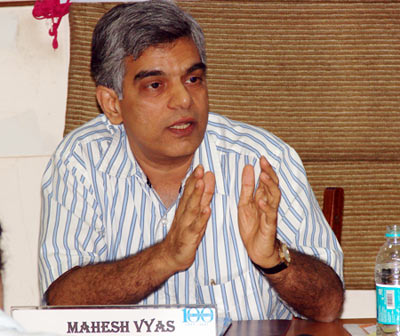
"Let's reduce our expectations from the Budget. It's very odd that after nearly two decades of liberalisation, we still attach so much importance to it. Liberalisation implies that the government's budget is not so important. We don't want the government to be too enthusiastic to create new schemes and new measures. If we expect them to do more and more things, they'll tax us more. So we better not expect them to do much, and hope that they leave our economy alone. The last 'great' thing the government did, the Special Economics Zone, is a disaster."
That, in short, was Centre for Monitoring Indian Economy CEO and Chairman Mahesh Vyas's message at the Indian Merchants' Chamber on Tuesday, in a forty-five minute address that touched a variety of issues, including the Congress's victory in the Lok Sobha elections and what it portends for the Indian economy, the spectre of high fiscal deficit, inflation projections and general thoughts about the Budget for 2009-10.
While most economists have trumpeted the newly formed Centre government as being 'stable', for Vyas, that's precisely the problem.
"With the Congress party's overwhelming win, the game has partially changed in favour of their taking bolder decisions. I'm not so certain that this is a good thing, because a government that's let loose can actually be trouble. It's sometimes good to have the government on tenterhooks."
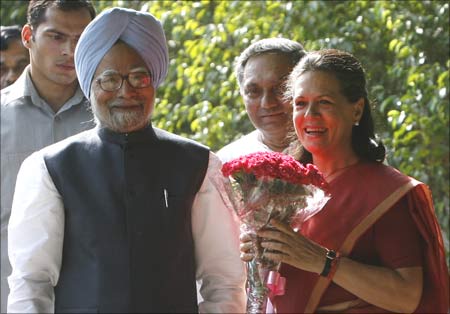
As for why the Congress was re-elected, Vyas believes it was a combination of short-term populist measures, like loan waivers for farmers, along with more long-term, far-reaching plans, like the National Rural Employment Guarantee Scheme.
"NREGS was the single most important reason why the Congress came back to power. NREGS made a real, tangible difference in people's lives, and worked very well in the Western belt, particularly in Rajasthan. Now I would expect the government to push this existing successful scheme in Orissa, Jharkhand and Bihar, into the interior of India," he said.
One benefit of the Congress' decisive victory, he explained, is that the government will be better able to resist short-term populist plans for additional long-term schemes.
"I believe the Congress has a long-term vision," he said. Still, although the Congress in recent years has become 'more efficient and mature', Vyas feels that the 2009-10 budget, 'will not contain the kinds of reforms that a Western analyst would want to see in India. . . like complete opening up of the economy and complete economic liberalisation'.
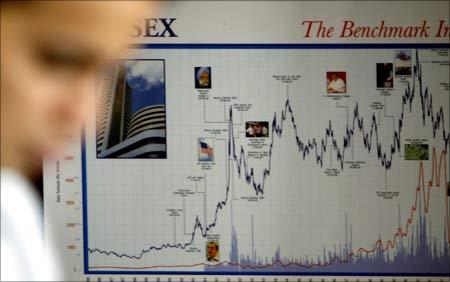
One pressing matter on which Vyas had an interesting perspective was India's burgeoning gross fiscal deficit, which Vyas this year feels will 'remain high'.
"I don't think it's a cause for concern. I have tortured the numbers in every which way I could torture them, to see if there really is a relationship between the gross fiscal deficit and inflation, measured any which way, or interest rates, measured any which way. And I found no relationship. That relationship is absent, in the data, for the last twenty years. So what are these economists saying?"
"The reason is not that the theory is wrong; it's just that the range of the gross fiscal deficit is still not bad enough to have an impact on inflation and interest rates. Which means that a 10% fiscal deficit -- Centre and state included -- is not something to get too worried about. The good thing is: we do worry about it. Therefore, we're not testing the limits of the theory. So it's good to be cautious."
"But if the deficit rises from 5.5% to 6.1% or 6.5%, I'm saying it's not a big deal. So I would say, expectations for the budget: high fiscal budget, but don't worry about it."
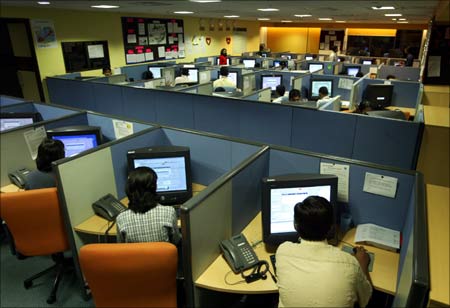
Vyas also held court on the state of the Indian economy, which he says is in 'pretty good shape'.
"There is a good likelihood, that in 2009-10, India will turn out to be the fastest growing relevant economy in the world, at about 6.6 per cent, which is similar to what we saw in 2008-09. But this growth I'm talking about for 2009-10 is not actually the whole story, because behind this sits a very substantial increase in the growth of industrial production, which is what I think matters the most."
"And if there is going to be something that spoils the story, it's going to be the services sector. And our services sector is likely to suffer because our exports are not going to do very well. If the world economy is going to shrink by 3 per cent, and if world trade shrinks by about 10 per cent, it will take a toll on our imports and exports, which will impact our GDP."
"It will affect both trade and transport measurements. Still, the economy is doing reasonably well. Industrial growth rate should double this year."

Moreover, Vyas had positive thoughts about the agricultural sector.
"2009-10 will be the seventh consecutive year of the agricultural sector not seeing a decline, and the fifth consecutive year with positive increase. Now that's never been seen in India. That is a phenomenal thing to have. And that shows up in consumer domestic demand. And consumer domestic demand is our saviour, is the reason why the Indian economy is not as stressed as other economies are. Agriculture is doing better than it ever did in the past, which is amazing, because there's hardly been any investment in agriculture in 30 years."
Vyas also tackled the issue of the 'truant monsoons'.
While admitting that a drought could hold negative ramifications for the economy, he explained that, "fortunately, the area under irrigation, making our vulnerability to the monsoon decline. The problem is, the reservoir levels are quite low. And that low reservoir levels can lead to low hydra-power creation, which will have a negative effect on the southern states. I see the Deccan Belt being the most affected area if the rains are insufficient. I find that to be a bit of a problem. Agricultural sector will not grow as well as it could have, if rains were normal."
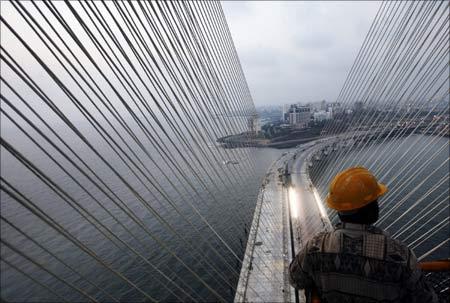
Perhaps the most important element of Vyas's address was his discussion of CMIE's projections for the commission of investments. "Based on our estimations, we are seeing Rs 5.5 lakh crore (Rs 5.5 trillion) of investments to get commissioned in 2009-10. I'm not talking about new proposals and outstanding numbers. I'm talking about commissioning of new projects."
Compare this to the Rs 2.2 lakh crore (Rs 2.2 trillion) that was commissioned last year, explained Vyas, and it's easy to see how the industrial sector will benefit. "These (projects) are big steel mills, big farm projects, big power projects and a host of other investments. What happens is that when a plant is commissioned, it starts employing people, it creates demand for services, transport increases and (newly employed people) start spending; so overall you get a higher level of activity. The multiplier effect on the economy will very, very substantial."
"And that's the reason that I am not only optimistic about the industrial sector in 2009-10, I am fairly optimistic about the industrial sector going ahead. So even if investment activity begins to go down, which I expect, industrial will continue to grow."
All in all, Vyas's message was summed up at the end of his address: "October 2008 was a blip. It was a blip that happened because of an earthquake elsewhere. But we quickly overcame it, and we're back to a more steady, more sustainable, more robust growth rate. This will happen till the next slowdown, which I believe is still some years away. To recover so quickly, the Indian economy has shown great resilience."